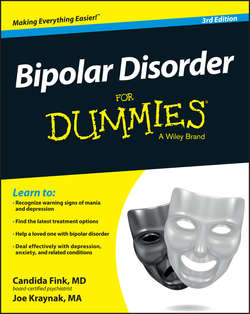Читать книгу Bipolar Disorder For Dummies - Joe Kraynak - Страница 9
На сайте Литреса книга снята с продажи.
Part I
Getting Started on Your Bipolar Journey
Chapter 1
Grasping Bipolar Disorder: Symptoms and Diagnosis
Distinguishing Bipolar from Conditions with Similar Symptoms
ОглавлениеBefore arriving at any medical diagnosis, doctors review a differential diagnosis to consider all the possible causes of the presenting symptoms. In bipolar disorder, the differential diagnosis often includes the following conditions that may involve symptoms similar to those of bipolar disorder:
✔ Unipolar depression: A major depressive episode without a history of mania or hypomania doesn’t qualify as bipolar disorder. However, if you experience depression and you have a history of bipolar disorder in any first-degree relatives (parent, sibling, or child), your doctor may want to monitor you closely if she starts treatment with an antidepressant, because of the increased risk that you may have bipolar disorder that hasn’t shown its manic pole yet. Additionally, the differentiation between unipolar and bipolar depression can be quite difficult. If a symptom such as agitation is present, it can be part of a mixed-mood episode of bipolar disorder, but it can also just be part of unipolar depression. Another difficult diagnostic situation is when during recovery from depression a person has periods of feeling particularly well. Are these periods symptomatic of hypomania or simply a strong recovery from a depressive episode?
✔ Anxiety: Anxiety may make you feel wired or tired with racing thoughts, poor sleep, and irritability, all of which overlap with symptoms characteristic of depression and mania. Many people with bipolar disorder also have an anxiety disorder, so they can happen together, but determining whether anxiety is the primary disorder rather than bipolar is important.
✔ Attention deficit hyperactivity disorder (ADHD): ADHD and mania are both characterized by impaired concentration and attention, impulsivity, high energy levels, and problems with organization and planning. However, for those with bipolar disorder, these symptoms are present only during a manic episode, not all the time. In addition, diagnostic criteria for hypomania or mania include an increase in goal-directed behavior, a decreased need for sleep, and grandiose thinking; ADHD doesn’t include any of these. The pattern of symptoms, especially the episodic nature of mood episodes, is a key way to distinguish bipolar disorder from ADHD.
✔ Schizophrenia and schizoaffective disorders: Schizophrenia and schizoaffective disorders are thought disorders characterized by psychosis – delusional thinking, paranoia, and auditory or visual hallucinations. Although psychosis may accompany mania and depression, the bipolar psychosis is present only during an acute mood episode and goes away during times of normal mood. In schizoaffective disorders, psychosis occurs for at least some period of time separate from the mood episodes. Schizophrenia and related disorders are persistent and severe disruptions of thinking and reality testing unrelated to mood episodes.
✔ Borderline personality disorder (BPD): BPD shares a few characteristics with bipolar. For instance, someone with BPD may be impulsive, irritable, and argumentative much like someone who’s experiencing a manic episode. However, BPD mood shifts are typically abrupt, short-lived, and in response to an external trigger, such as a conflict with another person; bipolar mood shifts are slower to develop, last longer, and may not appear to be in response to anything external. The rages that often characterize BPD aren’t equivalent to mania. BPD symptoms are chronic, representing the person’s baseline behaviors, whereas bipolar symptoms are episodic and different from the person’s usual behavior patterns.
✔ Other medical conditions: Many medical conditions – including brain tumors, meningitis, encephalitis, seizure disorders, brain injury, hormone imbalances, anxiety disorders, autism, and pervasive developmental disorder (PDD) – can produce symptoms similar to those of bipolar mania or depression.
✔ Mood instability caused by medications, alcohol, or drugs: A variety of prescription medications, alcohol, marijuana, and street drugs can affect moods. You and your doctor must rule out these possible causes before arriving at a diagnosis of bipolar disorder.
Be sure to tell your doctor if anyone in your immediate or close extended family has been diagnosed with bipolar disorder, schizophrenia, or substance use disorder (formerly known as substance abuse), especially if you’re seeking treatment only for depression. A close family history of these conditions increases the risk that you may eventually experience a manic or hypomanic episode resulting in a bipolar diagnosis. Medication treatment of unipolar and bipolar depressions is different – treatment with antidepressant alone in someone with bipolar disorder can trigger a shift to mania. Knowing about a family history of bipolar, you and your doctor can make a plan for close monitoring of your response to treatment for depression.
